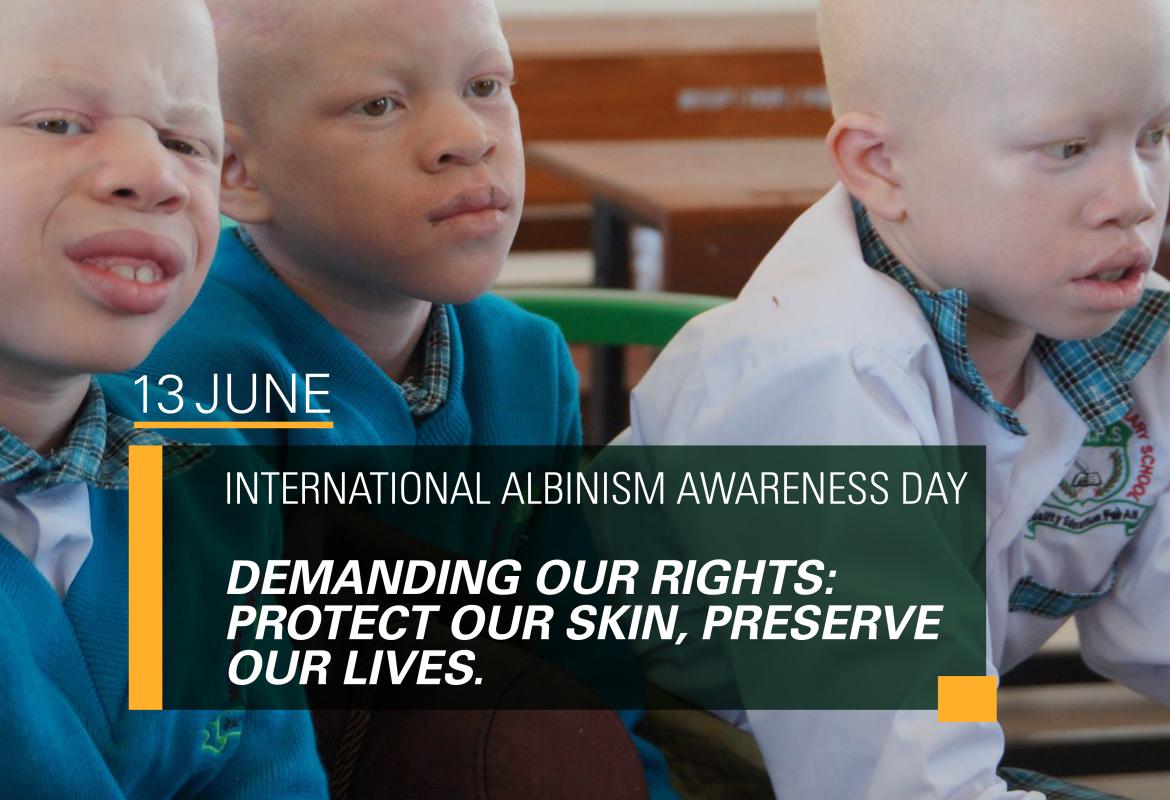Statement by the Working Group on Children With Disabilities of the African Committee of Experts on the Rights and Welfare of the Child (ACERWC) On the Occasion of International Albinism Awareness Day, 13 June 2025
On this International Albinism Awareness Day, commemorated under the theme " Demanding Our Rights: Protect our Skin, preserve our Lives’ the Working Group on Children with Disabilities of the African Committee of Experts on the Rights and Welfare of the Child (ACERWC), renews its commitment to the promotion and protection of the rights of children with albinism in Africa. This day serves as a powerful reminder of the plight of children with albinism, and the need to accelerate action to safeguard their wellbeing and adopt measures to address their specific needs.
Despite various national and regional efforts, children with albinism continue to face ritual attacks and killings, abductions and trafficking, separation from parental care, and abandonment. These violations are compounded by deeply rooted stigma, harmful traditional practices, and structural barriers that hinder access to basic service for children with albinism. Children with albinism are often excluded from accessing basic services that respond to their needs as they face lack of essential health services such as affordable sunscreen, protective clothing, skin treatments. They are also faced with educational exclusion due to stigma, bullying in schools, inadequate vision support in schools among others. Moreover, stigma isolates children with albinism, depriving them of community participation and equal opportunities.
The Working Group on Children with Disabilities of the ACERWC reiterates that such practices are in clear contravention of the African Charter on the Rights and Welfare of the Child, particularly non-discrimination (Article 3), the rights to survival and development (Article 5), protection against abuse (Article 16), education (Article 11), health (Article 14), right not be separated from parents/caregivers (Article 25).
The Working Group acknowledges and commends Member States of the African Union that have taken steps such as adopting national action plans, enacting anti-discrimination laws, and including albinism in disability frameworks. Nonetheless, more must be done. In its recent efforts, including the 2024 Day of General Discussion on ‘Solutions to the Challenges of Children with Albinism’ held during the 43rd Ordinary Session of the Committee, and its Resolution 19/2022 on Ending Harmful Practices against Children with Albinism, the Working Group has called for increased visibility of children with albinism in State Party reports and the integration of albinism-specific indicators across education, health, child protection, and budgeting frameworks.
In light of the 2025 theme of the International Albinism Awareness Day, the Working Group on Children with Albinism of the ACERWC adds its voice and encourages for:
The protection of the skin of children with albinism by providing sunscreen and other skin treatment medications for free
- Ensure that sunscreen and skin treatment medications are regarded as essential medicine for the right to life, survival, and development of children with albinism, hence, include these treatments in programming and budgeting in the health, education, and other sectors
Ensure that schools are friendly for children with albinism by addressing and responding to their sight and clothing requirements including by providing protective uniforms for free
Ensure that schools are free from bullying and discriminatory practices against children with albinism
Develop standardized guidelines for health workers at all levels on the measures to be undertaken and the treatments/medications to be provided for children with albinism on early identification and intervention to ensure the survival and development of children with albinism
Undertake sensitization measures among health, education, and social work service providers on the specific needs of children with albinism to protect their skins
Address discriminatory practices and the stigma attached to the skin of children with albinism by raising awareness at all levels in collaboration with traditional, religious, and community leaders
Encourage advocacy on the non-discrimination of children with albinism led by themselves to amplify their voices and ensure their participation in decision-making processes
Ensure the effective prosecution of perpetrators of discriminatory practices, and attacks against children with albinism with commensurate punishment to deter the practice
Accelerate the ratification and implementation of the Protocol to the African Charter on Human and Peoples’ Rights on the Rights of Persons with Disabilities (African Disability Protocol) and the African Charter on the Rights and Welfare of the Child for stronger legal protection
On this day, the Working Group on Children with Disabilities of the ACERWC calls on States, NHRIs, civil society, traditional leaders, and communities to stand in solidarity with children with albinism to protect their rights, and to embrace their full inclusion in every aspect of life.
#ProtectOurSkinPreserveOurLives
#AlbinismDay2025
#InclusionForChildrenWithAlbinism







